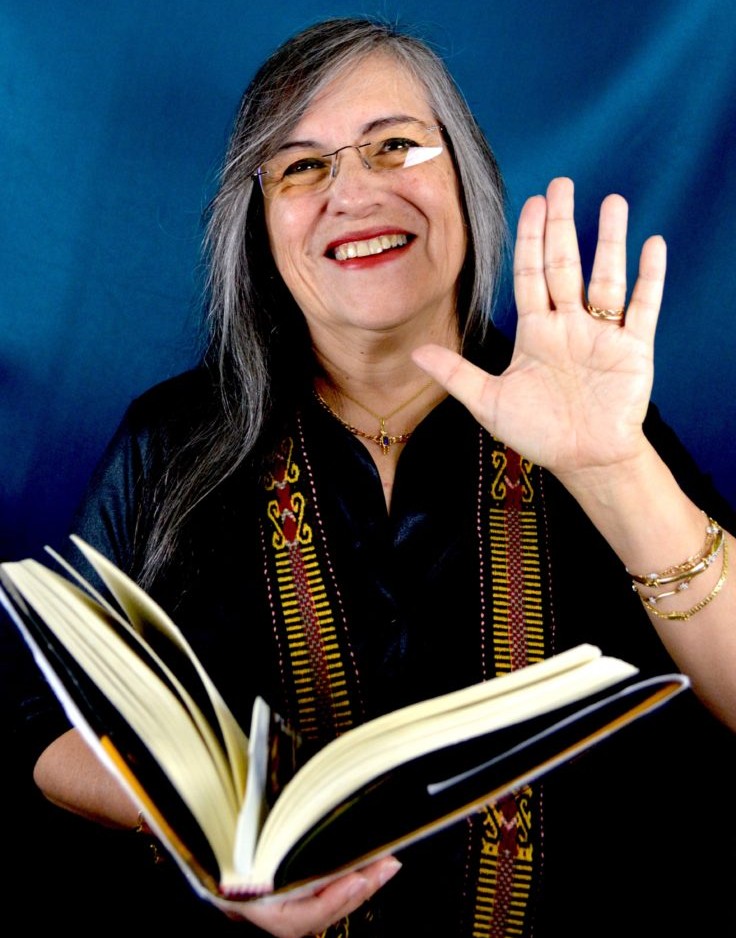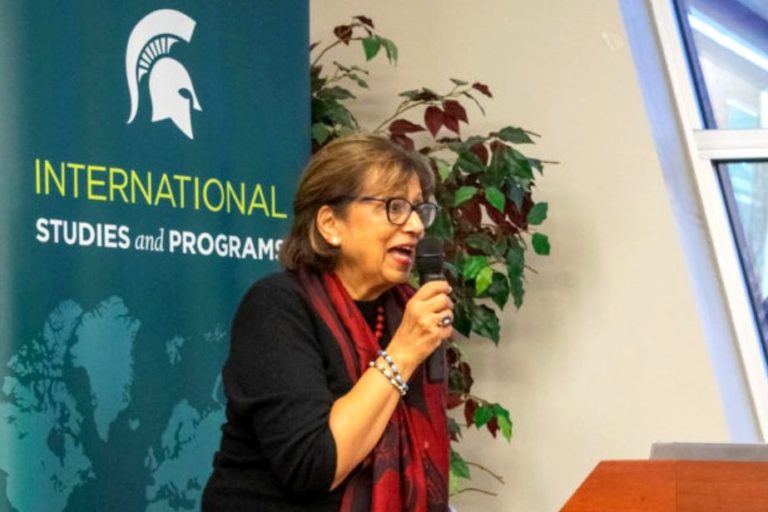Rocío Quispe-Agnoli, Professor of Hispanic Studies in the Department of Romance and Classical Studies and Editor in Chief of the Journal of Gender and Sexuality Studies, is a 2022 recipient of Michigan State University’s prestigious William J. Beal Outstanding Faculty Award, which honors faculty members for a comprehensive and sustained record of scholarly excellence in research and/or creative activities, instruction, and outreach.
With more than 20 years of experience as a college educator, the William J. Beal Outstanding Faculty Award recognizes Quispe-Agnoli for her outstanding leadership, mentoring of students and colleagues, internationally renowned scholarship, and dedication and service to her profession, department, and MSU community.
“[Dr. Quispe-Agnoli] guided me through the whole process of writing and defending the dissertation, navigating the difficult waters of being a woman of color and an international student in academia, and has offered her time on uncountable occasions with dedication and selfless care.”
Claudia Berrios-Campos, Ph.D. in Hispanic and Cultural Studies from MSU
As an innovative and effective instructor in Romance and Classical Studies, Quispe-Agnoli boasts a consistently strong teaching record in undergraduate and graduate education. She also excels in mentoring and advising students.
“[Dr. Quispe-Agnoli] guided me through the whole process of writing and defending the dissertation, navigating the difficult waters of being a woman of color and an international student in academia, and has offered her time on uncountable occasions with dedication and selfless care,” said Claudia Berrios-Campos, who recently earned her Ph.D. in Hispanic and Cultural Studies from MSU.

An internationally recognized teacher-scholar of Indigenous Latin American studies from the 16th to early 20th centuries, Quispe-Agnoli’s specialization and the scope of her research interests are not only defined by issues of race and ethnicity but also by questions about the position of the feminine and the masculine in gender studies; processes of cognition, perception, and (self) representation by different means, literary writing among them; the circulation of ideas and visual images across national borders, and the transformation of their meanings according to the cultural context in which they are used and reused.
Interdisciplinarity characterizes Quispe-Agnoli’s scholarly production. Her work combines the fields of intellectual history, anthropology, literary theory of colonial texts, art history and iconography, visual studies, semiotics, and postcolonial and subaltern studies.
“I needed to understand how and when our present-day inequalities began, including their origins and changes over time, while focusing on discovering ways to address them.”
Rocío Quispe-Agnoli, Professor of Hispanic Studies
Quispe-Agnoli’s work on identity, (self) identification, and (self) fashioning; gender; ways of knowing; and popular culture are thematic areas in which her scholarly interests can be organized. With her studies in these areas, she intends to uncover clues to the diverse and unresolved issues of contemporary (Latin) American societies and compare them with the colonial experiences of others from North America, Southeast Asia, or Australia. These themes do not exclude each other but rather intersect in various ways.
Understanding power and its effect on society — the administration of politics — brought her to focus on issues of imperialism, colonialism, and coloniality.
“While deciding on a topic for my B.A. thesis in Perú, a professor asked me what I wanted to know about the most and why. My decision brought me to my academic path: I needed to understand how and when our present-day inequalities began, including their origins and changes over time, while focusing on discovering ways to address them,” Quispe-Agnoli said.
Publication Record
Quispe-Agnoli’s publications include four scholarly books on Colonial Latin American literatures and cultures — La fe andina en la escritura, 2006; Nobles de papel, 2016, which received the 2017 Flora Tristán Book Award by LASA-Peru section; Women’s Negotiations and Textual Agency, 2017; and Latin American Literatures in Transition, pre-1492-1800, a collection of essays prepared in collaboration with Amber Brian (University of Iowa), and forthcoming with Cambridge University Press). Her first book, La fe andina en la escritura, which explored the impact of European writing on native societies of the early colonial Andean region, was featured in two TV documentaries, Sucedió en el Perú (broadcast in November 2006) and Televisión Nacional del Perú (broadcast in October 2015).
Once finished with the last revisions of the volume to be published by Cambridge UP, Quispe-Agnoli plans to continue working on her book manuscript, From Coyas to Doñas: Inca Noblewomen and the Making of the Colonial Archive, which studies written records and portraits of Inca characters authored and/or sponsored by Inca noblewomen between the 1550s and 1801.
The manuscript builds upon extensive archival work that she has been conducting during research trips to special collections in the United States, Peru, Mexico, and Spain. Women of the Inca elite contributed in this way to the making of the native archive and the shaping of Spanish-Andean colonial history. Their paper trail, their voices and stories, remain in the repositories of colonial archives around the world, unpublished for the most part, invisible to the official historical and literary traditions of colonial Spanish America.
“My passion for reading and writing has existed since I remember. This passion brought me to this profession and the profession has enhanced the necessity to express an awareness of my surroundings to address multiple human issues with ink on paper.
Rocío Quispe-Agnoli, Professor of Hispanic Studies
Quispe-Agnoli’s publication record also includes nearly 80 articles and book chapters. She has presented 158 papers and scholarly talks in local, national, and international venues.
Her latest publications include a critical-theoretical essay on the development of the key concept “Sujeto colonial” (Diccionario de términos críticos y palabras clave en la literatura latinoamericana. 2021); an interdisciplinary reflection about anthropocentrism and “colonialoceno” in the work of Indian writer Guaman Poma de Ayala, in collaboration with anthropologists A. Echazú and L. Greco (TECCOGS. Revista digitale de tecnologías cognitivas, 2021), and an essay on Inca Garcilaso de la Vega’s “Writing as an Indian” (MLA Approaching Teaching series, 2022).
Her more recent publications and presentations synthesize expressions and representations of indigeneity and the mestizo across national borders. Examples of these connections are her participation in a 2012 panel about the Indiana University Wanamaker Photography Collection and the works of early 20th-century Peruvian Indian photographers and her continuing study of alphabetic script on Amerindian societies, with the resulting admixture of graphic communication systems and the place of orality in relation to other tangible media.
Since January 2020, Quispe-Agnoli has served as Editor-in-Chief of REGS/Journal of Gender and Sexuality Studies, sponsored by the Association of Gender & Sexuality Studies and published by MSU Press.
“My passion for reading and writing has existed since I remember,” she said. “This passion brought me to this profession and the profession has enhanced the necessity to express an awareness of my surroundings to address multiple human issues with ink on paper. My lifetime relationship with the acts of reading and writing allows me to create parallel fictional worlds and to discover and examine the multiple worlds written by others.”
Awards and Honors
Quispe-Agnoli has represented her profession extensively. She has served on the Executive Councils of Colonial Latin American Studies at the Modern Language Association and currently serves on the Executive Board of the Association of Gender and Sexuality Studies and the Executive Council of the Colonial Section of the Latin American Studies Association.
Quispe-Agnoli has received many honors and distinctions recognizing her dedication and devotion to research, teaching, and service in a global context. In addition to the awards she has received as a teacher and scholar, her initiatives, innovations, publications, and presentations have been recognized as well. She received the 2013 TUMI USA award which celebrates her contributions of bringing to the forefront Peru’s rich cultural heritage, the 2013 Successful Peruvian Woman of the Year (Embassy of Peru in the United States), and the 2004 and 2008 CLACS Outstanding Faculty Award.
In 2019, Quispe-Agnoli received the Inspirational Woman of the Year recognition by GenCen after being nominated by her peers and students. And in 2016, she was recognized with the College of Arts & Letters’ Faculty Leadership Award for going “beyond the routine tasks, being generous in sharing insights and providing hard work and mentorship to others” as well as for “bringing the language sections within the College together in a fruitful collaboration in the areas of critical theory and cultural studies.”
Quispe-Agnoli’s latest award, the William J. Beal Outstanding Faculty Award, will be presented at MSU’s 2022 Awards Convocation on Wednesday, May 11, at the Kellogg Hotel & Conference Center at Michigan State University. For more information and a complete listing of MSU’s 2022 All-University Awards recipients, see the article in MSU Today.


